There was a time, not long ago at all, when having children was understood as a natural and meaningful milestone of adulthood. It was not viewed as a burden or a lifestyle complication. It was seen as a rite of responsibility and a continuation of the human story. Families expected it, communities supported it, and culture celebrated it. Today, those values are eroding. A growing number of young adults have embraced a worldview where children are unnecessary at best and undesirable at worst. Life has become a self-portrait where the only subject is the individual. The new guiding principle is simple. Life is about me.
This is not a harmless cultural shift. It is a fundamental threat to the future. A civilization can survive hardship, disaster, economic collapse, or political turmoil. It cannot survive a generation that stops creating the next one. Declining birth rates across nearly every developed nation reveal a chilling truth. People are no longer prioritizing the continuation of their own culture. They are choosing personal comfort over legacy. They are choosing temporary pleasure over generational survival. The fact that many nations now maintain birth rates well below replacement levels is not a demographic footnote. It is a warning siren.
Several forces are pushing this decline, and they all blend into a larger cultural illness. One of the loudest is hookup culture, which has replaced intimacy with convenience and commitment with temporary gratification. It encourages people to chase physical experiences without ever forming lasting bonds. Relationships become transactional. Affection becomes shallow. Responsibility becomes optional. When the purpose of relationships becomes personal enjoyment rather than personal growth, the idea of building a family naturally fades away.
Alongside this is a surge in narcissism that saturates modern life. Influencer culture, self-branding, and constant digital validation have created a generation conditioned to think of themselves first, second, and always. The message is repeated everywhere. Focus on yourself. Prioritize yourself. Serve yourself. When life becomes entirely inward facing, the thought of raising a child feels like an interference rather than a blessing. People who cannot imagine serving another human being for even a moment cannot fathom the lifelong service required of a parent. Narcissism shrinks the heart until it has no room for anyone else.
Then there are ideological movements that openly discourage parenthood. Some claim humanity is a plague on the planet and frame childbirth as an act of environmental harm. Others preach permanent independence as a form of empowerment, treating motherhood and fatherhood as outdated relics that limit personal growth. Some groups insist that loyalty should be directed toward political causes, social movements, or collective identities instead of family. When a generation is taught to place ideology above kinship, the natural instinct to form families can be replaced by devotion to institutions that do not care whether the individual thrives or collapses. A person without children becomes a person whose allegiance is easier to redirect.
Economic explanations also play a part, although not always for the reasons people think. It is true that housing costs have increased and that inflation creates new pressures on young adults. Those concerns should not be dismissed. Yet many of the same individuals who claim they cannot afford children spend freely on travel, entertainment, streaming subscriptions, high-end technology, and lifestyle luxuries that previous generations never considered essential. Some obstacles are real. Others are excuses that cover a deeper fear of responsibility. The difference between a genuine financial hardship and an exaggerated reason to avoid adulthood becomes clear when someone who feels financially unprepared suddenly discovers that they are expecting. Most of them rise to the occasion. They prioritize differently. They find a way. Human beings always have. And maybe that’s exactly why parenthood is being demonized; there are those who don’t want people to be able to find a way. They want them to be dependent…on them.
There is also a political dimension that is rarely mentioned but cannot be ignored. A population without strong families is easier to control. A person with children has loyalty to something outside the reach of government or ideology. They vote differently. They work differently. They think long-term. A childless citizen is often more dependent on external structures for identity, meaning, and community. In every era of history, leaders who sought power understood that breaking the family unit made people more malleable. When parenthood declines, centralized influence grows. A society without children becomes a society whose destiny is shaped by those who hold authority rather than those who hold responsibility.
All of this creates a culture where the idea of a child becomes something to avoid. Yet the greatest irony is that parenthood, which is treated as a burden, is the very force that gives life meaning. Until someone has a child, the purpose of their life tends to orbit around their own wants. They may pursue money, pleasure, entertainment, or ambition, but none of these things require true sacrifice. They do not shape character. They do not demand maturity. They do not confront a person with the question of who they are and who they want to become.
The moment someone becomes a parent, everything changes. A new life depends entirely on their choices. Their flaws matter in a different way. Their strengths matter in a different way. Their time, their energy, their patience, and their heart all begin to operate on a more urgent clock. Parenthood is a refining fire. It burns away the trivial and reveals the essential. The fear of failing your child becomes the motivation to rise above your weaknesses. The desire to give them a better life becomes the fuel to build one. Millions of people who once felt directionless have found purpose the first time they held their child.
The world needs more of that. It needs more people shaped by responsibility instead of indulgence. It needs more citizens who care about the future because their future has a name and a face. If enough individuals rediscover the power and joy of raising a child, culture can recover. This is the hope that still exists. People are not empty inside. They are unanchored. The instinct to nurture is still alive. It only needs to be awakened.
The path forward is simple. Encourage families. Celebrate parenthood. Restore respect for the sacrifice that builds the next generation. Remind people that a child is not a limitation. A child is a legacy. A child is the answer to the questions that so many modern adults cannot seem to solve. Why am I here? What’s my purpose?
The downfall of society begins when it forgets the value of its children or, even worse, undermines the idea of parenthood. The restoration begins the moment it remembers.
It’s time to remember.







